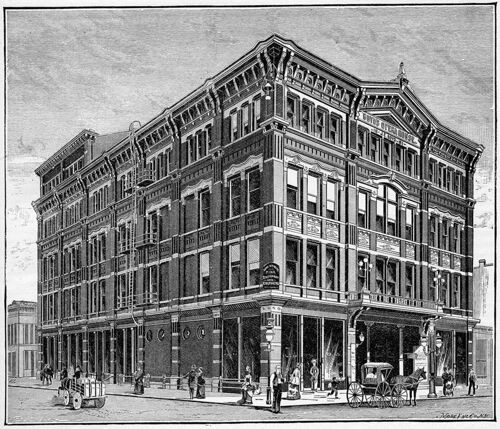Difference between revisions of "John Bailey McElfatrick (1826-1906), Architect"
(Adding project & reference.) |
|||
| Line 4: | Line 4: | ||
'''DBA:''' J. B. McElfatrick | '''DBA:''' J. B. McElfatrick | ||
| − | [[John Bailey McElfatrick (1826-1906), Architect|John Bailey McElfatrick]] was born in Harrisburg, Pennsylvania in 1826. He studied the trades of architecture and engineering under his father, Edward McElfatrick. By 1851, he was practicing independently. McElfatrick worked in Pennsylvania as well as cities further west, such as Cleveland, Cincinnati, Chicago, and St. Louis. He began building theatres in 1855, which was the start of a specialized career; some deemed his work influential enough to call him "The Father of American Theatres." By the 1880s, his sons William and John Morgan, had joined his company.[[#References|[1][2]]] He is credited with building over one hundred playhouses in New York City, Washington, Indianapolis, Memphis, Baltimore, St. Louis, Detroit, Atlanta, Boston, Nashville, Ottawa, Montreal, and elsewhere, including at least | + | [[John Bailey McElfatrick (1826-1906), Architect|John Bailey McElfatrick]] was born in Harrisburg, Pennsylvania in 1826. He studied the trades of architecture and engineering under his father, Edward McElfatrick. By 1851, he was practicing independently. McElfatrick worked in Pennsylvania as well as cities further west, such as Cleveland, Cincinnati, Chicago, and St. Louis. He began building theatres in 1855, which was the start of a specialized career; some deemed his work influential enough to call him "The Father of American Theatres." By the 1880s, his sons William and John Morgan, had joined his company.[[#References|[1][2]]] He is credited with building over one hundred playhouses in New York City, Washington, Indianapolis, Memphis, Baltimore, St. Louis, Detroit, Atlanta, Boston, Nashville, Ottawa, Montreal, and elsewhere, including at least three in Nebraska.[[#References|[2][5]]] J. B. McElfatrick died in 1906.[[#References|[1]]] |
This page is a contribution to the publication, '''[[Place Makers of Nebraska: The Architects]]'''. See the [[Format and contents of Nebraska architect entries|format and contents]] page for more information on the compilation and page organization. | This page is a contribution to the publication, '''[[Place Makers of Nebraska: The Architects]]'''. See the [[Format and contents of Nebraska architect entries|format and contents]] page for more information on the compilation and page organization. | ||
| Line 13: | Line 13: | ||
'''Kearney Opera House (1890)''', 21st Street & Central Ave., Kearney, Nebraska.[[#References|[4]]] | '''Kearney Opera House (1890)''', 21st Street & Central Ave., Kearney, Nebraska.[[#References|[4]]] | ||
| + | |||
| + | Lansing Theater (1891), SW corner of 13th & P, Lincoln, Nebraska.[[#References|[5]]] | ||
==References== | ==References== | ||
| Line 23: | Line 25: | ||
4. “A Grand Structure,” Kearney Daily Hub (May 17, 1890), 4. | 4. “A Grand Structure,” Kearney Daily Hub (May 17, 1890), 4. | ||
| + | |||
| + | 5. "Valuable Site Purchased. Tangible Evidence of a New Opera House. Henry Oliver and J. F. Lansing Proprietors--Ed A. Church Manager--Bids for Excavation Now Being Received," ''(Lincoln) Nebraska State Journal'' (May 2, 1891), 7. | ||
==Page Citation== | ==Page Citation== | ||
Revision as of 07:14, 20 December 2017
DBA: J. B. McElfatrick
John Bailey McElfatrick was born in Harrisburg, Pennsylvania in 1826. He studied the trades of architecture and engineering under his father, Edward McElfatrick. By 1851, he was practicing independently. McElfatrick worked in Pennsylvania as well as cities further west, such as Cleveland, Cincinnati, Chicago, and St. Louis. He began building theatres in 1855, which was the start of a specialized career; some deemed his work influential enough to call him "The Father of American Theatres." By the 1880s, his sons William and John Morgan, had joined his company.[1][2] He is credited with building over one hundred playhouses in New York City, Washington, Indianapolis, Memphis, Baltimore, St. Louis, Detroit, Atlanta, Boston, Nashville, Ottawa, Montreal, and elsewhere, including at least three in Nebraska.[2][5] J. B. McElfatrick died in 1906.[1]
This page is a contribution to the publication, Place Makers of Nebraska: The Architects. See the format and contents page for more information on the compilation and page organization.
Nebraska Buildings & Projects
Boyds Opera House (1881), 15th & Farnam, Omaha, Nebraska.[3]
Kearney Opera House (1890), 21st Street & Central Ave., Kearney, Nebraska.[4]
Lansing Theater (1891), SW corner of 13th & P, Lincoln, Nebraska.[5]
References
1. Sandra L. Tatman, "McElfatrick, John Bailey (1826-1906)", Philadelphia Architects and Buildings (2017). Accessed on January 2, 2017. https://www.philadelphiabuildings.org/pab/app/ar_display.cfm/23155
2. "McElfatrick, John Bailey", Biographical Dictionary of Architects in Canada, n.d. Accessed on January 2, 2017. http://dictionaryofarchitectsincanada.org/node/2195
3. Omaha Illustrated: A History of the Pioneer Period and the Omaha of Today. (Omaha: D. C. Dunbar & Company, January, 1888).
4. “A Grand Structure,” Kearney Daily Hub (May 17, 1890), 4.
5. "Valuable Site Purchased. Tangible Evidence of a New Opera House. Henry Oliver and J. F. Lansing Proprietors--Ed A. Church Manager--Bids for Excavation Now Being Received," (Lincoln) Nebraska State Journal (May 2, 1891), 7.
Page Citation
D. Murphy, “John Bailey McElfatrick (1826-1906), Architect,” in David Murphy, Edward F. Zimmer, and Lynn Meyer, comps. Place Makers of Nebraska: The Architects. Lincoln: Nebraska State Historical Society, January 4, 2017. http://www.e-nebraskahistory.org/index.php?title=Place_Makers_of_Nebraska:_The_Architects Accessed, January 28, 2026.
Contact the Nebraska State Historic Preservation Office with questions or comments concerning this page, including any problems you may have with broken links (see, however, the Disclaimers link at the bottom of this page). Please provide the URL to this page with your inquiry.
